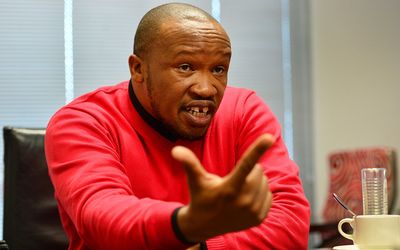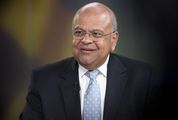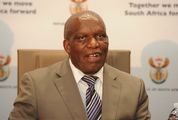A METALS industry arrangement under which unions and employer bodies earned millions every year has fallen apart, leaving the National Union of Metalworkers of SA (Numsa) starved of funds.
Numsa says it is not yet broke but the loss of about R90m a year since 2012 has hit it hard.
A collective bargaining levy agreement in the Metals and Engineering Industries Bargaining Council has expired.
According to insiders, the squeeze on the purse of the largest union in the country is the reason it has not yet launched its United Front political movement.
The National Employers Association of SA (Neasa) has refused to contribute to the fund, saying it disagreed with the "principle" of having nonunionised members pay a fee that would benefit unions.
This is Neasa’s second major contest of arrangements in the bargaining council. It is challenging in court the labour minister’s right to extend an agreement made with Numsa in 2014 after a bloody and protracted wage strike. Neasa did not agree with the deal made with Numsa and says it should, therefore, not be obliged to implement the wage hike agreed to then.
Numsa general secretary Irvin Jim on Wednesday said the levy was provided for in the Labour Relations Act. It is a fee paid by nonunionised workers who benefit from collective agreements that are negotiated by unions and employers in the bargaining council.
According to the last agreement, the aim of the levy is to "ensure that all employees who receive the benefits of collective bargaining contribute towards its costs".
All employees paid a collective bargaining levy and unions earned a pro rata portion, so Numsa, being the biggest, benefited the most.
Mr Jim described the employer body’s reluctance to enter into another collective bargaining agreement on the levy as an "attack".
"It is an attack both on unions and on collective bargaining," the general secretary said.
Unions had obtained the 50% plus one threshold required for the agreement and would be seeking a meeting with Labour Minister Mildred Oliphant to gain her assistance in reinstating the levy, he said.
It is understood that Numsa was out of pocket for about R250m since the expiry of the agreement. The situation has been described as "dire", and the union is relying largely on its reserves, which insiders say were meant to contribute to funding the United Front.
To add to the union’s woes, large numbers of workers were being retrenched in the sectors in which it organises, cutting the subscription fees it collected monthly.
But Mr Jim said Numsa was working hard to organise across other sectors, after it had obtained permission to do so from the Department of Labour at the end of last year.
Neasa CE Gerhard Papenfus said Numsa’s claim that there was money owed to it was not true as there was no agreement in place after the previous one lapsed in December 2012.
The unions would have to ensure an agreement was in place before taking it to the minister to be extended to all parties, he said.
A levy is also paid to employer organisations. "Neasa can benefit financially from the levy, but we are opposing it in principle; we say it is wrong," he said, describing the levy as "easy money" for the unions.
Workers should not be penalised for freely choosing not to join a union, Mr Papenfus said.
The largest employer body in the council, the Steel and Engineering Industries Federation of Southern Africa (Seifsa) denied that the unions had obtained the 50% plus one legislative requirement for the collective bargaining levy.
Seifsa operations director Lucio Trentini said even if unions did meet the requirement, the federation did not have a mandate from its members to agree to such a levy.
Head of Solidarity’s metals and engineering industry, Marius Croucamp, said he hoped the levy would be reinstated, as it was important funding for unions’ socioeconomic campaigns. "It is important to get the funds back to enhance our socioeconomic projects," he said.
Solidarity, however, had not used the levy for "operational" expenses. Mr Croucamp said talks on a new levy agreement had begun and he was hopeful an agreement could be reached, despite Neasa’s opposition.
The metals and engineering sector is not the only one in which the levy was halted. The South African Transport and Allied Workers Union last year could not pay salaries due to a funding shortfall that was made worse by an agreement in that sector lapsing.

Numsa general secretary Irvin Jim. Picture: GALLO IMAGES/LEON SADIKI
A METALS industry arrangement under which unions and employer bodies earned millions every year has fallen apart, leaving the National Union of Metalworkers of SA (Numsa) starved of funds.
Numsa says it is not yet broke but the loss of about R90m a year since 2012 has hit it hard.
A collective bargaining levy agreement in the Metals and Engineering Industries Bargaining Council has expired.
According to insiders, the squeeze on the purse of the largest union in the country is the reason it has not yet launched its United Front political movement.
The National Employers Association of SA (Neasa) has refused to contribute to the fund, saying it disagreed with the "principle" of having nonunionised members pay a fee that would benefit unions.
This is Neasa’s second major contest of arrangements in the bargaining council. It is challenging in court the labour minister’s right to extend an agreement made with Numsa in 2014 after a bloody and protracted wage strike. Neasa did not agree with the deal made with Numsa and says it should, therefore, not be obliged to implement the wage hike agreed to then.
Numsa general secretary Irvin Jim on Wednesday said the levy was provided for in the Labour Relations Act. It is a fee paid by nonunionised workers who benefit from collective agreements that are negotiated by unions and employers in the bargaining council.
According to the last agreement, the aim of the levy is to "ensure that all employees who receive the benefits of collective bargaining contribute towards its costs".
All employees paid a collective bargaining levy and unions earned a pro rata portion, so Numsa, being the biggest, benefited the most.
Mr Jim described the employer body’s reluctance to enter into another collective bargaining agreement on the levy as an "attack".
"It is an attack both on unions and on collective bargaining," the general secretary said.
Unions had obtained the 50% plus one threshold required for the agreement and would be seeking a meeting with Labour Minister Mildred Oliphant to gain her assistance in reinstating the levy, he said.
It is understood that Numsa was out of pocket for about R250m since the expiry of the agreement. The situation has been described as "dire", and the union is relying largely on its reserves, which insiders say were meant to contribute to funding the United Front.
To add to the union’s woes, large numbers of workers were being retrenched in the sectors in which it organises, cutting the subscription fees it collected monthly.
But Mr Jim said Numsa was working hard to organise across other sectors, after it had obtained permission to do so from the Department of Labour at the end of last year.
Neasa CE Gerhard Papenfus said Numsa’s claim that there was money owed to it was not true as there was no agreement in place after the previous one lapsed in December 2012.
The unions would have to ensure an agreement was in place before taking it to the minister to be extended to all parties, he said.
A levy is also paid to employer organisations. "Neasa can benefit financially from the levy, but we are opposing it in principle; we say it is wrong," he said, describing the levy as "easy money" for the unions.
Workers should not be penalised for freely choosing not to join a union, Mr Papenfus said.
The largest employer body in the council, the Steel and Engineering Industries Federation of Southern Africa (Seifsa) denied that the unions had obtained the 50% plus one legislative requirement for the collective bargaining levy.
Seifsa operations director Lucio Trentini said even if unions did meet the requirement, the federation did not have a mandate from its members to agree to such a levy.
Head of Solidarity’s metals and engineering industry, Marius Croucamp, said he hoped the levy would be reinstated, as it was important funding for unions’ socioeconomic campaigns. "It is important to get the funds back to enhance our socioeconomic projects," he said.
Solidarity, however, had not used the levy for "operational" expenses. Mr Croucamp said talks on a new levy agreement had begun and he was hopeful an agreement could be reached, despite Neasa’s opposition.
The metals and engineering sector is not the only one in which the levy was halted. The South African Transport and Allied Workers Union last year could not pay salaries due to a funding shortfall that was made worse by an agreement in that sector lapsing.






















Change: -1.55%
Change: -1.49%
Change: -2.49%
Change: -1.19%
Change: -1.90%
Data supplied by Profile Data
Change: 0.00%
Change: 0.00%
Change: -1.55%
Change: 0.00%
Change: 0.00%
Data supplied by Profile Data
Change: 1.99%
Change: 1.04%
Change: 2.57%
Change: 3.17%
Change: 0.23%
Data supplied by Profile Data
Change: 0.00%
Change: 0.00%
Change: 0.00%
Change: 0.00%
Change: 0.00%
Data supplied by Profile Data